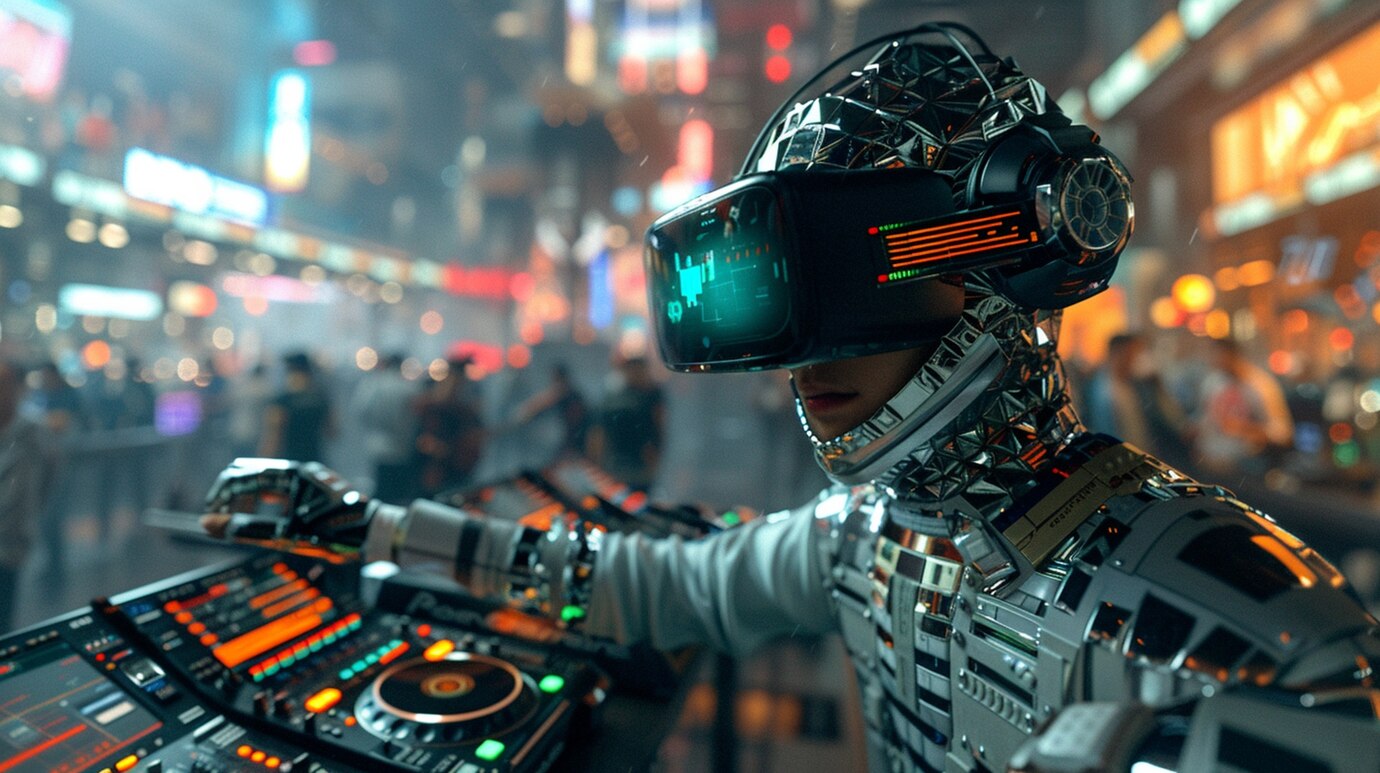Introduction
Artificial Intelligence (AI) has been making significant strides across various industries, and the entertainment sector is no exception. From personalized content recommendations to the creation of entirely new forms of media, AI is revolutionizing how we consume and interact with entertainment. This article delves into the multifaceted role of AI in shaping future entertainment content, exploring its impact on film, music, gaming, and more.
The Evolution of AI in Entertainment
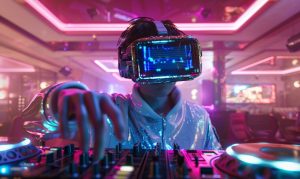
1. Early Beginnings
The journey of AI in entertainment began with simple algorithms designed to recommend content based on user preferences. Early examples include music recommendation systems like Pandora and movie suggestions on platforms like Netflix. These systems laid the groundwork for more sophisticated AI applications in entertainment.
2. Current State
Today, AI is not just recommending content; it is creating it. From AI-generated music and scripts to virtual actors and immersive gaming experiences, the capabilities of AI in entertainment have expanded exponentially. Companies like OpenAI, Google DeepMind, and NVIDIA are at the forefront of these innovations, pushing the boundaries of what is possible.
AI in Content Creation
AI is becoming an essential tool in content creation across various entertainment sectors. In film and television, AI assists writers by providing plot ideas, analyzing audience preferences, and even suggesting character development arcs. This allows creators to tailor their content more closely to what audiences enjoy. Similarly, in music production, AI can compose original tracks or generate background scores with minimal human input, making it easier and faster for creators to produce content.
AI in Film and Television

1. Scriptwriting and Storytelling
AI algorithms are now capable of generating scripts and storylines. Tools like ScriptBook analyze existing scripts to predict their success and suggest improvements. AI can also assist in the creative process by generating new ideas and plotlines, offering a valuable resource for writers and producers.
2. Special Effects and Animation
AI is revolutionizing special effects and animation, making them more realistic and cost-effective. Deep learning algorithms can create highly detailed and lifelike animations, reducing the need for manual labor and speeding up production times. AI-driven tools like DeepFake are also being used to create realistic digital doubles of actors, opening new possibilities for storytelling.
3. Audience Engagement
AI is enhancing audience engagement through personalized content recommendations and interactive experiences. Platforms like Netflix and Amazon Prime use AI to analyze viewer preferences and suggest content tailored to individual tastes. Interactive films and series, where viewers can make choices that influence the storyline, are also becoming more popular, thanks to AI.
Personalizing Viewer Experiences
One of the most significant contributions of AI in entertainment is its ability to personalize content for users. Streaming platforms like Netflix and Spotify use AI algorithms to analyze user behavior and recommend content that aligns with their preferences. This results in a highly customized viewing or listening experience, where users are shown content they’re more likely to enjoy. While this leads to increased user engagement, it also raises concerns about the creation of filter bubbles, limiting exposure to new and diverse content.
AI in Music

1. Composition and Production
AI is making waves in the music industry by composing and producing music. Algorithms like OpenAI’s MuseNet can generate music in various styles and genres, while tools like Amper Music allow artists to create custom tracks by specifying parameters like mood, tempo, and instrumentation. This democratizes music production, making it accessible to a broader audience.
2. Music Recommendations
AI-powered recommendation systems are transforming how we discover music. Services like Spotify and Apple Music use machine learning algorithms to analyze listening habits and suggest new tracks and artists. These systems continuously learn and adapt to user preferences, offering a more personalized listening experience.
3. Live Performances
AI is also making its mark on live performances. Virtual artists like Hatsune Miku, a holographic pop star, have gained massive followings, and AI-driven visual effects are enhancing concert experiences. AI can analyze audience reactions in real-time, allowing performers to adjust their sets and create more engaging shows.
The Ethical Challenges of AI in Entertainment
With AI becoming more involved in content creation and distribution, ethical concerns are also on the rise. One of the major challenges is job displacement, as AI tools can automate tasks traditionally handled by humans, potentially leading to fewer opportunities for writers, musicians, and animators. Additionally, AI’s heavy reliance on user data for personalized recommendations has led to growing concerns about privacy and how data is being collected and used. Addressing these challenges will be crucial as the entertainment industry continues to embrace AI.
AI in Gaming

1. Game Development
AI is revolutionizing game development by automating various aspects of the process. Procedural content generation algorithms can create vast and intricate game worlds, while AI-driven characters offer more realistic and dynamic interactions. This allows developers to focus on creativity and innovation, pushing the boundaries of what games can achieve.
2. Player Experience
AI is enhancing player experiences by creating more personalized and immersive games. Machine learning algorithms analyze player behavior to adjust difficulty levels, offer tailored content, and create adaptive narratives. AI-driven non-player characters (NPCs) can also learn and evolve, offering more challenging and engaging interactions.
3. Esports and Competitive Gaming
AI is making significant contributions to esports and competitive gaming. Advanced analytics tools use AI to analyze gameplay and offer insights into strategies and performance. AI-driven bots are also being used for training purposes, helping players improve their skills by offering challenging opponents.
The Rise of AI in Streaming Platforms
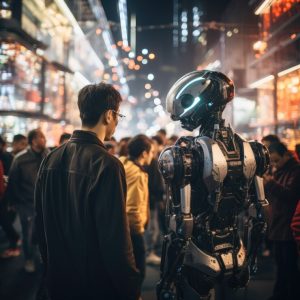
1. Improving Viewer Engagement
Streaming platforms heavily rely on AI to keep users engaged. AI-powered recommendation engines, personalized playlists, and even auto-generated trailers keep users coming back for more. Platforms like YouTube and Twitch use AI to analyze user data and recommend videos or channels, keeping viewers hooked for longer periods.
Additionally, AI-driven analytics help platforms determine which content is most likely to go viral, assisting creators and distributors in optimizing their strategies. By identifying trending topics and viewer engagement patterns, AI helps platforms focus on content that drives engagement.
2. Reducing Piracy
AI is also instrumental in combating piracy in the entertainment industry. Machine learning algorithms are being employed to identify and take down pirated content across the web. These AI systems scan websites, social media, and streaming platforms, identifying illegal copies of copyrighted materials.
While anti-piracy AI has made significant strides, it’s an ongoing arms race between AI tools used by copyright holders and the methods employed by pirates to circumvent detection.
Ethical Concerns and Challenges
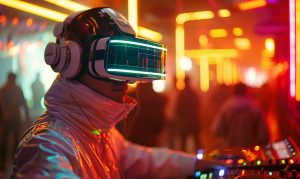
1. Loss of Human Jobs
One of the most prominent concerns surrounding AI in entertainment is the potential loss of jobs. Automation of tasks like scriptwriting, music composition, and even editing has led to fears that human roles in the entertainment industry may become obsolete. While AI can improve efficiency, there is concern that over-reliance on AI could replace human creativity and labor.
2. Data Privacy
As AI in entertainment relies heavily on user data to provide personalized experiences, concerns over data privacy are growing. Platforms must be transparent about how they collect, store, and use user data, ensuring compliance with privacy laws and regulations.
3. The Risk of Homogenized Content
While AI can analyze audience preferences to create content tailored to specific tastes, this might lead to homogenization, where content becomes too similar across different platforms. Over-reliance on AI-driven recommendations can limit exposure to diverse genres and ideas, leading to a lack of variety in entertainment.
The Future of AI in Entertainment
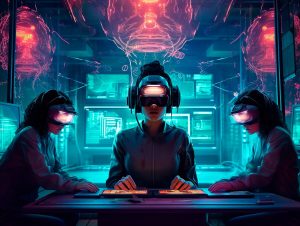
1. Ethical Considerations
As AI continues to shape the future of entertainment content, ethical considerations must be addressed. Issues like data privacy, algorithmic bias, and the potential for job displacement need to be carefully managed. Ensuring transparency and accountability in AI applications is crucial for building trust and maintaining the integrity of the entertainment industry.
2. Emerging Technologies
Emerging technologies like virtual reality (VR) and augmented reality (AR) are set to further revolutionize entertainment, with AI playing a central role. AI-driven VR and AR experiences offer unprecedented levels of immersion and interactivity, creating new possibilities for storytelling and audience engagement.
3. Collaborative Creativity
The future of entertainment lies in the collaboration between human creativity and AI capabilities. By leveraging AI as a tool for innovation, artists and creators can push the boundaries of what is possible, creating richer and more diverse forms of entertainment.
Analysis Table: Impact of AI on Entertainment Sectors
| Sector | AI Application | Impact on Industry |
|---|---|---|
| Film & TV | Scriptwriting, VFX | Faster production, more personalized content |
| Music | Composition, Recommendation Systems | Streamlined production, better user engagement |
| Gaming | Procedural Generation, AI Opponents | Dynamic gameplay, replayability, and enhanced player experiences |
| Streaming Platforms | Personalization, Piracy Prevention | Increased engagement, better content recommendations |
Comparative Table: Traditional Methods vs. AI-Powered Methods in Entertainment
| Aspect | Traditional Methods | AI-Powered Methods |
|---|---|---|
| Scriptwriting | Manual, requires human creativity | AI-assisted, more data-driven |
| Visual Effects (VFX) | Labor-intensive, time-consuming | AI automates tasks, faster and cost-effective |
| Music Composition | Composed manually by artists | AI can create original compositions |
| Game Development | Pre-scripted worlds and NPCs | AI-driven procedural generation and adaptive NPCs |
| Content Recommendations | Limited to generic suggestions | Personalized through machine learning |
Conclusion
AI is undeniably transforming the landscape of entertainment content. From film and music to gaming and beyond, AI is enhancing creativity, personalization, and engagement. As we look to the future, the potential for AI in entertainment is boundless, offering exciting opportunities for both creators and audiences alike. By embracing these advancements while addressing ethical considerations, we can look forward to a new era of entertainment that is more immersive, personalized, and innovative than ever before.

